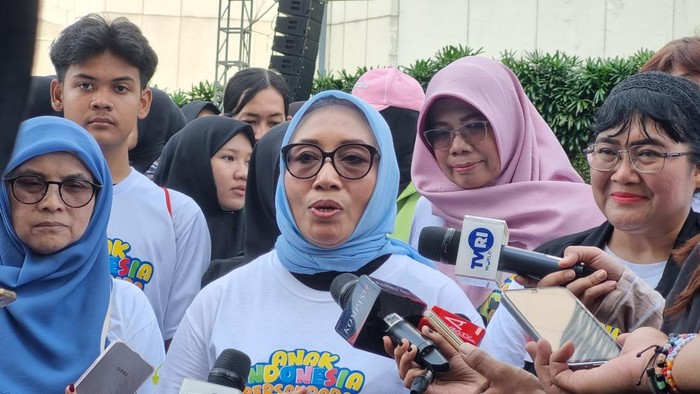Jakarta –
The Minister of Women’s Empowerment and Child Protection (PPPA), Arifatul Choiri Fauzi, stated that the case of a baby trafficking syndicate to Singapore has been handled by the government. The babies intended for sale have now been secured.
“We have handled it, and the baby is now safe. However, we are still investigating, though this is not under our jurisdiction,” said Arifatul after the National Children’s Day event at Bundaran HI, Central Jakarta, Sunday (20/7/2025).
Arifatul mentioned that the babies have been taken to a safe location or shelter. The PPPA Ministry is currently providing assistance for the infants.
“We are only providing support and care for these babies. They are now safe,” explained Arifatul.
“We cannot disclose the exact location of the babies because it is not here. They are in a safe house,” she added.
It is known that the West Java Police uncovered a baby trafficking case to Singapore involving 24 children. The Indonesian Child Protection Commission (KPAI) stated that only six babies were rescued and remain in Indonesia.
“One child is sick. Out of the six, one is ill. The others are healthy, and all are under the protection of the West Java Social Service. I assure you, these children are safe under state care,” said KPAI Chairperson Ai Maryati when contacted on Friday (18/7).
Ai then stated that the other 18 victims may have already been sent to Singapore or other countries by the perpetrators. She urged law enforcement to return the victims to their mothers.
“The remaining 18 have likely been taken abroad. This is no longer just a hope—on behalf of the Indonesian people and optimal law enforcement, we must recover them,” she said.
Ai believes this case should be escalated to the National Police Headquarters, as it requires Interpol coordination with foreign authorities.
Watch Video: Faces of the Suspects in the Baby Trafficking Syndicate to Singapore
Bundaran HI
Bundaran HI, also known as the Hotel Indonesia Roundabout, is a prominent landmark in Jakarta, Indonesia, located in front of the historic Hotel Indonesia. Built in 1962 to welcome guests of the Asian Games, it features the iconic *Selamat Datang* (Welcome) Monument, a sculpture symbolizing hospitality. The site remains a central gathering point and a symbol of Jakarta’s modernization.
Central Jakarta
Central Jakarta is the administrative and political heart of Indonesia, home to key government buildings, including the National Monument (Monas) and the Presidential Palace. Established during Dutch colonial rule as Batavia, it became the center of governance and retains historic landmarks like the Old Town (Kota Tua). Today, it blends colonial heritage with modern skyscrapers, serving as a bustling business and cultural hub.
West Java Police
The **West Java Police** (Polda Jawa Barat) is the regional police force responsible for maintaining law and order in West Java, Indonesia. Established as part of the Indonesian National Police (Polri), it plays a key role in crime prevention, security operations, and community policing in one of Indonesia’s most populous provinces. The force has evolved alongside Indonesia’s political changes, adapting to modern policing demands while addressing regional challenges such as urbanization and terrorism threats.
Indonesian Child Protection Commission (KPAI)
The Indonesian Child Protection Commission (KPAI) is an independent institution established in 2003 under Law No. 23 on Child Protection. Its primary role is to monitor and advocate for children’s rights, ensuring their protection from abuse, exploitation, and discrimination. KPAI works with government agencies, NGOs, and communities to promote policies and programs that safeguard children’s welfare in Indonesia.
West Java Social Service
The West Java Social Service is a government agency in Indonesia’s West Java province, focused on social welfare programs, including poverty alleviation, disaster relief, and community support. Established to address social inequalities and improve living standards, it plays a key role in implementing regional and national social policies. Its history reflects Indonesia’s broader efforts to strengthen social services since independence, particularly in densely populated regions like West Java.
National Police Headquarters
The **National Police Headquarters** is the central administrative and operational hub for a country’s police force, typically overseeing law enforcement activities nationwide. Historically, such headquarters have evolved alongside modern policing systems, often established in the 19th or 20th century to centralize command and improve public safety. Many are located in capital cities and serve as symbols of authority, sometimes housed in architecturally significant buildings reflecting their institutional importance.
Interpol
Interpol, or the International Criminal Police Organization, is an intergovernmental organization established in 1923 to facilitate cross-border police cooperation and combat international crime. Headquartered in Lyon, France, it enables law enforcement agencies from 195 member countries to share data and coordinate operations. Unlike a police force itself, Interpol provides investigative support, databases, and alerts (such as Red Notices) to assist in apprehending criminals globally.
Singapore
Singapore is a vibrant city-state in Southeast Asia, known for its modern skyline, multicultural heritage, and bustling port. Founded as a British trading post in 1819 by Sir Stamford Raffles, it gained independence in 1965 and rapidly developed into a global financial hub. Today, it blends diverse cultures, lush green spaces, and iconic landmarks like Marina Bay Sands and Gardens by the Bay.






